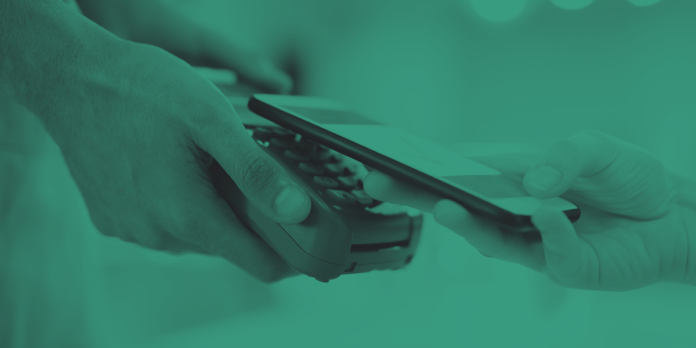Can cryptocurrencies become embedded in the fabric of our shopping habits? As the world embraces digital payments, cryptocurrencies face a unique opportunity to revolutionize the way we transfer money. Several companies around the world are on a mission to find a perfect payment solution for the digital future, but two projects in the DACH region may be the closest to starting a financial revolution. Will they manage to write cryptocurrencies into our grocery receipts?
With the progressing digitalization of the financial sector, the way we shop constantly changes. Cash is losing importance, as mobile payments are revolutionizing the market. In fact, by 2022 mobile transactions are predicted to become the second most popular payment method, just after debit cards. Experts estimate that the total transaction value of digital payments may continue to rise with an annual growth rate fixed at 12%, reaching its all-time high of US $6,699,201 million ($6.7 trillion) by 2023.[1]
Several companies are developing a secure digital payment method, which allows people to pay with digital currencies. Ready to address the needs of the changing market and take advantage of the shift in people’s purchasing habits, they set out to create a tool, which would support effortless Bitcoin and Ethereum transactions in numerous supermarkets and shops. One major project of such kind is Ingenico’s and Salamantex’s collaboration aimed to create the software for various types of digital currency payments.
Ingenico, an expert in providing seamless payment solutions, has been on the market for over 30 years successfully adapting to the evolving financial landscape. Salamantex, on the other hand, was founded in 2017 and has been dedicated to creating crypto-friendly fintech software ever since. Ingenico’s and Salamantex’s project is designed to encourage cryptocurrency use in everyday life by authorizing payments in Bitcoin, Ethereum, and Dash in the supermarket terminals. How does it work? You can choose to pay in a cryptocurrency as you settle your bill. After your payment’s been authorized, the transaction amount is simply converted to the sellers’ preferred currency just as it is transferred to their accounts.
The companies presented the first POS terminal at the EuroShop 2020 trade fair in Düsseldorf, Germany. Their collaboration combines Salamantex’s digital enthusiasm and appetite for innovation with Ingenico’s vast experience and secure solutions. Over the years, Ingenico’s built a reputation of a reliable terminal producer: there are over 30 million of their terminals around the world. Integrated with Salamantex’s software, which also works as a mobile & web application and plug-in for online shops, they may start the brand-new era of digital payments, especially in the DACH region, where they mainly operate. According to Statista’s new reports, the German digital payment sector is set to generate a total transaction value of US $127,443 million ($127 billion) in 2020[2], compared to Austria’s US $15,082 million ($15 billion)[3] and Switzerland’s US $20,927 million ($20 billion).[4] These numbers are expected to gradually rise in all the mentioned countries, which is promising for Ingenico, whose terminals are approved by all major German payment network operators.
As German and Austrian companies are on their quest to revolutionize payment systems in the European Union, Switzerland is undertaking its own mission to offer a cryptocurrency payment option for Swiss merchants and customers. Worldline, the popular financial services provider, and Bitcoin Suisse, Switzerland’s largest crypto company, announced they would cooperate to enable digital transactions in cryptocurrencies in brick and mortar stores and on online stores across Switzerland. Worldline operates in 30 countries and has 85,000 payment terminals in Switzerland alone. In 2018, Worldline generated $2.2 billion in revenue from their payment services.
Bitcoin Suisse’s CEO, Dr Arthur Vayloyan, called their collaboration “a major step forward on the journey to bring crypto payments into broader adoption”, adding that “Bitcoin Suisse is proud to serve as the processor of cryptocurrencies in Worldline’s payment service system”.
So who will win the race to bring crypto payments to our local grocery store? Well, first it’s not a race anymore, because Worldline is buying Ingenico for a valuation of $8.6 billion. However, the problem with crypto payments is that cryptocurrency users do not want to spend their cryptocurrencies. They believe the price will go up further, so they only spend their monthly return from staking or lending. However, this infrastructure will be used by some, especially die-hard crypto fans.
In that sense, Switzerland’s project will most likely gain more traction initially, because Switzerland is undoubtedly one of the most crypto-friendly countries in the world. The Swiss city of Zug accepted Bitcoin as a valid payment method for public services in 2016 when public trust in cryptocurrencies was much lower. In addition, the Swiss Central Bank has an ambitious plan to launch its own pure digital currency. Although there is progress in Germany on the custody side, all countries in the European Union are still under pressure from the European Banking Association to steer clear of crypto assets.
Will cryptocurrencies win people over once they become
relevant everyday payment methods? Whose project will make history and whose
idea will bite the dust? Whatever awaits our digital kingdoms, one thing is
sure: innovation will always find a way to redefine who we are and how we shop.
[1]See Digital Payments worldwide, Statista
[2] See FinTech: Germany, Statista
[3] See FinTech: Austria, Statista
[4] See FinTech: Switzerland, Statista




